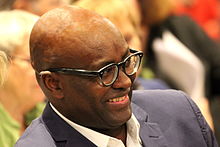African philosophy
African philosophy before the 20th century was primarily conducted and transmitted orally as ideas by philosophers whose names have been lost to history.
In contrast, Africana philosophy addresses the philosophical concerns, experiences, and identities of Africans in the diaspora, particularly in regions outside Africa such as the Americas and the Caribbean.
One well-known example of the economic philosophical works emerging from this period was the African socialist philosophy of Ujamaa propounded in Tanzania and other parts of Southeast Africa.
These African political and economic philosophical developments also had a notable impact on the anti-colonial movements of many non-African peoples around the world.
His research on ubuntu presents an alternative collective discourse on African philosophy that takes differences, historical developments, and social contexts seriously.
This form of natural philosophy is identifiable in Africa even before individual African philosophers can be distinguished in the sources.
[7] When it comes to the modern era and the 20th century, a new beginning is linked to the 1920s, when African individuals who had studied in the United States and Europe ("Western" locations) returned to Africa and reflected on the racial discrimination experienced abroad.
[14] In North Africa, arguably central to the development of the ancient Egyptian philosophical tradition of Egypt and Sudan was the conception of ma'at, which roughly translated refers to 'justice', 'truth', or simply 'that which is right'.
Philosophical concepts such as Ifá, Omoluabi, Ashè and Emi Omo Eso were integral to this system, and the totality of its elements are contained in what is known amongst the Yoruba as the Itan.
His proverbs are still recited by Senegalese and Gambians alike, including in Senegambian popular culture - for example in Ousmane Sembene's films such as Guelwaar[18][19] Other notable philosophical thinkers include the Gambian historian Alieu Ebrima Cham Joof, and the Malian ethnologist Amadou Hampâté Bâ.
Many Central African philosophical traditions before the Bantu migration into southern Central Africa have been identified as a uniting characteristic of many Nilotic and Sudanic peoples, ultimately giving rise to the distinctive worldviews identified in the conceptions of time, the creation of the world, human nature, and the proper relationship between mankind and nature prevalent in Dinka mythology, Maasai mythology and similar traditions.
[26] In fact it would be more realistic to call them candidates for the position of African philosophy, with the understanding that more than one of them might fit the bill.
(Oruka later added two additional categories: literary/artistic philosophy, such as the work of literary figures such as Ngũgĩ wa Thiong'o, Wole Soyinka, Chinua Achebe, Okot p'Bitek, and Taban Lo Liyong, and hermeneutic philosophy, the analysis of African languages in order to find philosophical content.)
He interacts with a multitude of modern subjects, including thoughts on statehood, death, capital, racism, and colonialism.
Many recent pieces from Mbembe, including Critique of Black Reason, suggest that understanding Europe as a force not at the center of the universe is a point from which philosophy and society should view the world.
According to this view, African philosophy can be best understood as springing from the fundamental assumptions about reality reflected in the languages of Africa.
Another example of this sort of approach is the work of Ebiegberi Joe Alagoa of the University of Port Harcourt in Nigeria, who argues for the existence of an African philosophy of history stemming from traditional proverbs from the Niger Delta in his paper "An African Philosophy of History in the Oral Tradition."
Alagoa argues that in African philosophy, age is seen as an important factor in gaining wisdom and interpreting the past.
It is dangerous to judge by appearances ("A large eye does not mean keen vision"), but first-hand observation can be trusted ("He who sees does not err").
Leopold Senghor, a proponent of Negritude, argued that the distinctly African approach to reality is based on emotion rather than logic, works itself out in participation rather than analysis, and manifests itself through the arts rather than the sciences.
Philosophical sagacity is a sort of individualist version of ethnophilosophy, in which one records the beliefs of certain special members of a community.
[26] Some African philosophers classified in this category are Odera Oruka, Paulin Hountondji, Peter Bodunrin, Kwasi Wiredu, Tsenay Serequeberhan, Marcien Towa and Lansana Keita.
[26] Nationalist and ideological philosophy might be considered a special case of philosophic sagacity, in which not sages but ideologues are the subjects.
In either case, the same sort of problem arises with retaining a distinction between ideology and philosophy, and also between sets of ideas and a special way of reasoning.
[29] While many traditional African societies are highly religious, their religions are not revealed, and hence, ethics does not center around divine commands.
This is a relatively new (since the 1980s) and developing name given to African thought, and it is given credible attention by professional organizations, including the American Philosophical Association.
[30] Africana philosophy includes the philosophical ideas, arguments and theories of particular concern to people of African descent.
[32][31] African philosophy seeks a middle ground between dualism and monism regarding the material and spiritual, noting their correlativity.
Truth is considered relativist, and relies on what is meant or understood, which is not always translatable between individuals or cultures owing to differing paradigms and linguistical conventions.
Universal justifiers of epistemological claims are: linguistic-conceptual schemes, human nature, socio-cultural values and interests, and customs and habits, which commonly instil confidence.
